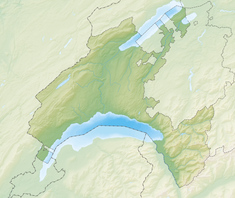The synagogue of Lausanne (French: synagogue de Lausanne) is a synagogue located on Avenue de Florimont in Lausanne, Vaud, Switzerland.
| Synagogue of Lausanne | |
|---|---|
| Native name Synagogue de Lausanne (French) | |
 | |
| Type | Synagogue |
| Location | Avenue de Florimont Lausanne, Vaud, Switzerland |
| Coordinates | 46°30′59″N 6°38′16″E / 46.51639°N 6.63778°E |
| Built | 1909–1910 |
| Architect | Charles Bonjour, Adrien van Dorsser, Oscar Oulevey |
| Architectural style(s) | Romanesque-Byzantine |
| Governing body | Israelite Community of Lausanne and the Canton of Vaud (CILV) |
| Official name | Synagogue |
| Reference no. | 6202 |
History
In the early 20th century, the Jewish community gathered in the Jean-Jacques Mercier building on Rue du Grand-Chêne in Lausanne. The community grew rapidly and wanted to have a larger place of worship.[1]
Upon the death of French merchant Daniel Iffla ("Osiris"), the City Council of Lausanne received a bequest of 50,000 francs. This donation aimed at building a new synagogue which had to be inspired from the Buffault Synagogue in Paris.[2]
The synagogue was built in 1909–1910[1] thanks to the financial support of the local Ashkenazi community.[3] The City of Lausanne also allocated 300,000 francs for the construction.[4] The building was designed by Vaudois architects Charles Bonjour, Adrien van Dorsser and Oscar Oulevey and inaugurated on November 7th, 1910.[5]
The cost of land acquisition and construction totalled 280,000 francs, including 48,000 francs for the structural system and 28,000 francs for the decoration and the furniture.[1]
After WWII, the community grew and integrated Sepharadi Jews, which requested unity in the rites and the use of the synagogue.[6]
In 2010, Israelite Community of Lausanne and the Canton of Vaud (CILV) celebrated the centenary of the synagogue and organised events aimed at "forging bonds with Lausanne and Vaud people",[7] including an exhibition about the history of the synagogue.[8]
The synagogue is now listed among the Cultural Property of National Significance.[9] It is used for Shabbat celebrations, but usually the daily service takes place in a smaller underground room.[5] In 1995, a liturgical music concert took place at the synagogue.[10]
Architecture
The Romanesque-Byzantine[1] synagogue has a long nave that can be reached from the vestibule. Three sides of the nave are bordered by galleries with 160 seats for women. The stalls are dedicated to men only.[1] The Almemohr has a tabernacle with the Torah scrolls, as well as the seat used by the rabbi. The paintings were made by Otto Alfred Briffod and the stained-glass windows were manufactured by the workshop Guignard & Schmid.[1] There is an adjacent sacristy. The underground floor has several locales.
See also
References
- ^ a b c d e f "La Synagogue de Lausanne". Bulletin technique de la Suisse romande (in French). Vol. 38, no. 2. January 25, 1912. pp. 19–23. doi:10.5169/seals-29467.
- ^ Lüthi 2016, pp. 176–177.
- ^ Hanhart, Joël (2016). Waldemar Mordekhaï Haffkine (1860-1930). biographie intellectuelle (in French). Paris: Honoré Champion. ISBN 9782745330741.
- ^ Signoreli, Mathieu (October 20, 2010). "Un siècle de culte juif à Lausanne". Le Temps (in French).
- ^ a b "Grande Synagogue de Lausanne". cisrl.ch (in French). Retrieved August 17, 2012.
- ^ "Les 100 ans de la synagogue de Lausanne". pasaj.ch (in French). Retrieved August 17, 2012.
- ^ Nicollier, Marie (October 22, 2010). "La synagogue célèbre ses 100 ans en grande pompe". 24 heures (in French).
- ^ "Synagogue de Lausanne 1910-2010" (pdf). cilv.ch (in French). Retrieved August 17, 2012.
- ^ "Inventaire des biens culturels d'importance nationale". api3.geo.admin.ch (in French). Federal Office for Civil Protection (FOCP). Retrieved November 10, 2019.
- ^ "Concert de Musique Liturgique Juive a la Synagogue de Lausanne CD". cduniverse.com (in French). Retrieved August 17, 2012.
Bibliography
- Lévy, Ronald; Shamgar, Eran (2010). La Synagogue de Lausanne: 100 ans de présence en Belle Fontaine (in French). Israelite community of Lausanne and the Canton of Vaud.
- Epstein-Mil, Ron; Richter, Michael (2015). Les synagogues de Suisse : construire entre émancipation, assimilation et acculturation (in French). Neuchâtel: Alphil..
- Lüthi, Dave, ed. (2016). Lausanne. Les lieux du sacré. Architecture de poche (in French). Vol. 3. Berne: Société d’histoire de l’art en Suisse. pp. 176–177. ISBN 978-3-03797-277-9.

